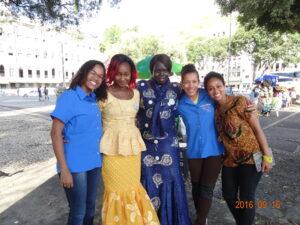The Meeting of Afro-Brazilian Culture and African Activists in Bahia
The Brazilian state of Bahia reverberates with a strong and vibrant Afro-Brazilian history and culture. Its main city of Salvador was one of the first cities established by the Portuguese, and it was the first port in the Americas to be used as an entry point for Africans brought over as slaves. An estimated 1.2 million Africans were forcibly brought to Salvador (four times the number of Africans brought to the entire United States). Because of this history, Bahia has an especially strong connection to Africa and is known for being the center of Afro-Brazilian culture.
These factors played into selecting Salvador as the location for part of an international learning exchange with our partners and allies, including: We Are the Solution (WAS) in Senegal, Guinea, Ghana; La Via Campesina’s Women’s Commission in Honduras; and IDEX partners from the Surplus People Project in South Africa, Ñepi Behña in Mexico and AFEDES in Guatemala. The purpose of the exchange was to learn and exchange experiences with movements in Brazil.
The first part of the September 2016 exchange was in state of Goiás with the MCP, which you can read more about here.
As part of our learning exchange with the Landless Workers Movement (MST), we met with Fabya Reis, a former leader in the MST, who is now the Secretary of Promotion of Racial Equality for the state of Bahia. She was an active member of the MST for 15 years before taking this role. Fabya had heard that our group included women from Africa and for that reason she especially wanted meet with us.
At our meeting the members of WAS – Sia, Mariama and Anita – shared about the experience of rural women farmers in West Africa and about the movement they are building. Fabya shared with us that the United Nations declared the decade between 2015 and 2024 the International Decade for People of African Descent. This was news to all of us and we were glad to learn about it! She is doing a lot of work to promote the Decade for People of African Descent in Bahia – meeting with our delegation being a piece of that.
The next morning we participated in the opening ceremony of a state-wide conference of MST educators. This was a meeting of hundreds of educators from encampments and settlements around the state, who were meeting to discuss rural education and the movement. They invited us to be part of the opening ceremony.
In an interview at the MST, Anita Sutha, from WAS-Ghana, reflected on what she learned during this trip. She said that, “The way that work is organized connecting the relationship between agroecology and education are examples that I will bring back with me to Ghana.” And noting the similarities between the context in West Africa and in Brazil she said, “The struggle of the MST seems very similar to the way that we organize our base in Africa. Our movement is composed of women farmers. There, we practice agroecology and family farming using indigenous knowledge, with the objective of promoting food sovereignty in our countries.”
The last day of the learning exchange was spent in the historical district of Salvador. Fabya arranged for us to visit the Protective Association of the Underprivileged, an association established by free Black men in 1832. We met with the leaders of the association to learn about its history. Guided by the values of “charity, solidarity and fraternity,” this association was founded as an abolitionist organization, participating in struggles and revolts that eventually led to the end of slavery in Brazil 1888.
Today the association works to preserve and strengthen the historical legacy of Afro-Brazilians, through educational and social actions, promoting Afro-Brazilian culture, providing social, legal and psychological support services, and hosting meetings that contribute to the empowerment and protagonism of the Black population, especially Black women. The leadership of the Association today is majority women.
Learning opportunities sometimes happen in unexpected places! While some of us were outside of the Mercado Modelo as others in our group shopped for souvenirs, two Brazilian women approached Mariama Sonko (of WAS-Senegal) and Sia Anne Marie Kamano (of WAS-Guinea), noticing their colorful dresses. The two women worked as tour guides and they wanted to see if Mariama and Sia would be interested in a tour. The offer was declined, but from there the women struck up a conversation with Mariama and Sia, curious to know where they were from in Africa.

Mariama explained that they were from Senegal and Guinea, and we told them a bit about learning exchange. As it happens, one of the women was a capoeira master and had studied Afro-Brazilian history as well as her own personal genealogy. (Capoeira is a martial art that was developed in Brazil by slaves as form of self-defense disguised as a dance.) She shared with us some of the history of capoeira that pre-dates its development in Brazil, saying that the roots of capoeira can be traced to West Africa. Before arriving in Brazil something similar to capoeira was a traditional competition between young men to win over women for marriage. This woman was very excited to learn that Mariama and Sia were from West Africa because she had done a genetic test to see where in Africa her ancestors had come from and found that some of them were from Guinea. Mariama gave them a welcoming embrace as reunited sisters.


